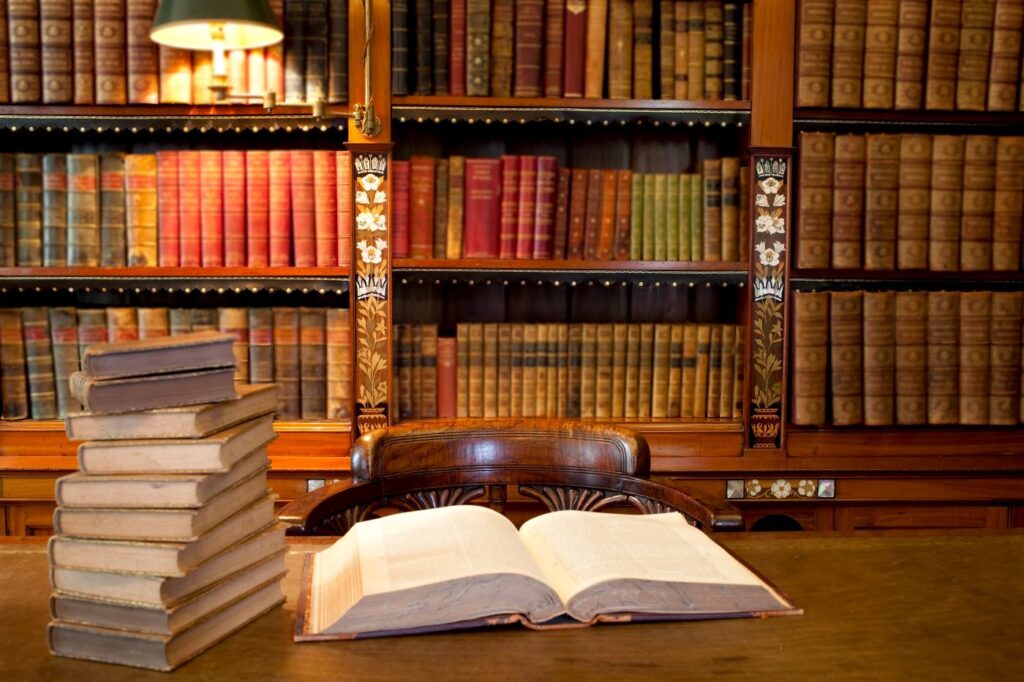Others have a fancy for a good horse or dog or bird: my fancy, stronger even than theirs, is for good friends. And I teach them all the good I can and recommend them to others from whom I think they will get some moral benefit. And the treasures that the wise men of old have left us in their writings I open and explore with my friends. If we come on any good thing, we extract it, and we set much store on being useful to one another. –Socrates (Xenophon’s Memorabilia, I.6)
Homer. Plato. Shakespeare. Augustine. Dante. Kant. Dostoyevsky. Morrison. Imagine filling in a couple hundred more recognizable authors, representing the classic texts, or “Great Books,” of Western civilization. Can we responsibly compose a twenty-first-century college education around the reading, careful study, and discussion of those texts, complemented by careful study of languages, writing, mathematical demonstration, music theory, and laboratory science?
At St. John’s College, Santa Fe and Annapolis, probably the best-known pure Great Books college (also, notably, not religious despite the name), we believe not just that you can pursue education this way but that it is one of the very best ways to achieve all the most important aims of a college education. Having just completed my ninth year as Dean and twentieth on the faculty, I have faced again and again a catalogue of skeptical or anxious questions and challenges to our model. These include questions about liberal education and the liberal arts (often mistakenly taken to be synonymous with the humanities) and, of course, questions about the Great Books.
In my world, there is constant handwringing and debate about cost and affordability (and institutional sustainability); about the politics of race and gender and the current academic (and broader) culture wars; about safety, violence, and self-harm on our campuses; and about the deleterious effects of technology (notably smartphones, social media, and generative AI) on student mental health, socialization, and academic preparedness and integrity. These concerns point to the need for greater commitment to our schools and colleges and greater investment, both financial and moral, in education at all levels. They point to the need for renewal, inspiration, and ambition within our educational culture. They point to the need to recenter education on the human person and on the humane values embodied in the traditions of the liberal arts and liberal education and their analogues in primary and secondary education—that is, education on a human scale, with teachers and students, parents and friends studying and learning together, in small communities, in small classes, in relatively de-technologized environments. And finally, they point to the pressing need to cultivate habits of mind and character, both intellectual and moral, that will equip students to navigate and address the growing challenges we face as a society.
Start your day with Public Discourse
Sign up and get our daily essays sent straight to your inbox.In my experience, among open-minded students and parents, the salient challenges to “the most contrarian college in America” (and to the liberal arts more broadly) come under a few headings. I cannot pretend to fully answer them here, but I can sketch where more thorough answers and arguments might go.
Cost and Return on Investment: College is too expensive. I (or my child) will be burdened by student loan debt.
This can be aimed at all higher education but is particularly projected onto seemingly high-priced private and liberal arts colleges. Yet for most students receiving financial aid, private colleges can be as or more affordable than public ones. Our graduates’ debt loads prove moderate by national standards and are easily eclipsed by the expected difference in earnings both short- and long-term.
The average lifetime financial benefits of a college education, including in the humanities and liberal arts, make it a wise investment for the overwhelming majority of students and their families, moderate student debt loads notwithstanding. Even when we rehearse these well-known data, financial anxiety, especially among low- and middle-income families and among first-generation college students and their households, remains understandably high. Attending college is a high-stakes decision in every way, including financially. Higher education at all levels needs to continue to work toward greater access and affordability and greater transparency. However, we also need to be willing to defend patiently and thoroughly the cost, the investment, and the value proposition of a liberal arts education.
Practicality, Specialization, and Majors: What will my child do with this liberal arts degree?
Our answer has long been “whatever they want.” It is a preparation for life and, in principle, can lead them on toward almost any area in their career. Educational “consumers,” reflecting our broader social discourse, overestimate the necessity and value of early specialization and career focus in higher education. Data have long shown, and in some cases increasingly show, that many students will end up with a different major from what they predict as incoming students (or they will change their major altogether). More generally, an increasing number of college graduates work in areas not directly connected to their majors. This is tied to the (perhaps paradoxical) fact that technological and economic evolution means that workers will change jobs and types of jobs more now, over the course of their careers, than ever before. This fact puts a premium on transferable skills and generalizable abilities and versatility, for instance, skills like verbal and written communication.
There are understandable, if unfortunate, economic and cultural reasons why career and income anxiety weigh heavily on the minds of college students and their parents. Ironically, however, the most far-sighted among us see that many of the trends driving that anxiety point to sustaining or renewing the values and achievements associated with a liberal arts education, while devaluing potentially transient technical or narrowly specialized training at the undergraduate level. The impact that technological disruptions and economic uncertainty are having on career prospects and stability heightens the value of the broad-based, transferable skills inculcated by a well-balanced liberal education (which includes mathematics and natural science). Technical training is increasingly “perishable.” Aiming at a narrow career path, however trendy, is an increasingly high-risk strategy. The more fluid our career lives become, and the more dynamic and disruptive technological and economic forces and innovations are, the more we should anchor our undergraduate education, at least in large part, on broad, secure, lasting foundations and goals.
Presentism and Scientific Progress: What can Plato or Ptolemy teach us about our world today?
This challenge is so deeply embedded in our cultural consciousness that responding to it requires us to excavate our widely held assumptions. The model of historical progress is right at the heart of our modern Western, now global, civilization. Experience does better than arguments here, but we should accept that we cannot really understand our contemporary world, or its achievements, without understanding how we got here. This inquiry includes, perhaps above all, the foundational works–of philosophy, literature, theology, and science–that have shaped our world, that have given us the horizons of language, values, and knowledge that we inhabit.
We can find forms of beauty and virtue and knowledge in the classics of the past. We may find that we have lost understanding of some things, even as we have gained understanding of others. Yet challenging the assumptions of one’s own time and place is perhaps the key to becoming a free mind capable of making sound judgments. Careful reading and exploration deepen our understanding of our current world by showing its roots. They also sharpen our self-knowledge and self-understanding and open us up to consider genuine alternatives that reflect different individual and cultural achievements of the past.
Careful reading and exploration deepen our understanding of our current world by showing its roots. They also sharpen our self-knowledge and self-understanding and open us up to consider genuine alternatives that reflect different individual and cultural achievements of the past.
STEM for All: I want my child to pursue a STEM major or career, or at the least, be versed in the STEM disciplines.
The orientation of higher education toward what we now call STEM education represents a long (decades-, even centuries-long) arc of evolution. But we are living at a moment when several factors have converged to intensify this trend: the dazzling effects of contemporary technology, the related concern about sustainable career paths, economic anxiety, and skepticism of the substance of what is taught in the humanities all loom large.
We need to calm the fever around STEM. The “S” (science) and “M” (mathematics) should simply be part and parcel of a well-balanced liberal education. All liberal education advocates should staunchly defend a traditional balance of the liberal arts (reflected, for example, in the classical “trivium” of grammar, rhetoric, and logic, and the “quadrivium” of arithmetic, geometry, astronomy, and music). The liberal arts may be anchored in the humanities today, so be it, but the liberal arts must be broader than that. Liberal education requires deep engagement with math and science, and this too can be done in a way that is “humane” and liberating and valuable for all students, not just for those oriented toward STEM careers. And for those who are so oriented, most students will do better and go further in their careers if they expand the broad basis of their education and delay to some extent the technical specialization they may know or think they want to pursue.
Beyond this, STEM mania is a special case of an obsessive (and futile) attempt to future-proof career prospects and job security. But the most insightful students of economic and technological history, such as Yuval Noah Harari, argue persuasively that the accelerating rate and scale of technological disruption increase the value of liberal education. Narrowly technical skills and jobs are those most vulnerable to usurpation by technological innovation. The well and liberally educated worker and citizen will be the one able to adapt, learn new skills, and engage and manage thoughtfully the role of technology in our lives today and tomorrow. We will be (much) better off if our engineers and technologists have studied with care Aristotle and Galileo, Bacon and Marx, for example.
Consumerism and Choice: I want my child to choose what they do in college.
The psychology of consumerism and freedom of choice, even for young people, is deeply entrenched in our democratic social and individual character. An older argument, which has a kind of immediate force to it, was that it is only after having been educated into a kind of responsible mature self-possession that we are well-equipped to choose for ourselves. In that worldview, the idea that young people would be consumers in a marketplace of ideas, following their own muses and tastes, seemed upside down. But today, we have to strike a balance. If we are going to present more requirements and more educational delayed gratification, so to speak, we must be able to present that case persuasively and rhetorically.
At St. John’s, our president praises our incoming first-year students for having made the “courageous choice” to undertake our almost all-required curriculum, in which they will have much less choice along the way. But in doing so, they will develop far greater agency than those who are given too much choice and use it in too diffuse or superficial ways through their college years. One might hope, as I do, that the increasing superficiality and chaos of “choice” that our totally connected digital world is imposing on all of us would lead to a renewed appreciation for carefully curated curricula anchored in works and areas of study of uncontroversial gravity and beauty.
One might hope, as I do, that the increasing superficiality and chaos of “choice” that our totally connected digital world is imposing on all of us would lead to a renewed appreciation for carefully curated curricula anchored in works and areas of study of uncontroversial gravity and beauty.
Bias: The so-called Great Books (or the humanities) reflect a political ideology masquerading as a neutral education for all.
Among the most difficult challenges to a Great Books program like ours is the longstanding accusation that in presenting these Great Books we are advancing one or another political ideology or bid for cultural hegemony. One question comes from the progressive left, and it alleges that by reading a traditional Western canon of dead white European males, we are reinscribing and advancing a tradition of racism, sexism, colonialism, and Eurocentric cultural hegemony, and excluding other voices that are marginalized by that tradition. We see an equally prominent challenge from the political and religious right, namely, that the American professoriate, academic elites, and educators skew overwhelmingly left and have turned mainstream American higher education into a system of liberal indoctrination. This challenge touches everything from emerging norms around gender identity and sexual politics to cancel culture and trigger warnings, critical race theory, the substance of what is taught in history, philosophy, politics, literature, and so on.
A subtle version of this challenge is that the effect of an open-ended engagement with the history of Western thought, absent some stable foundation of moral, political, or religious value, may have a corrosive effect or invite skepticism or relativism as a natural endpoint. On this view, embedding the Great Books educational philosophy within a secure civic or religious framework is the healthier course.
Be Not Afraid
These critiques are not to be dismissed. They reflect our society’s deepening political polarization and the growing climate of mistrust in longstanding institutions and in the very idea of common ground and shared values, culture, and traditions. For the open-minded inquirer, however, my advice is simple: Come and see. A liberal education pursued in good faith, that is, with civility, generosity, humility, and an earnest desire (among teachers and students) to think for oneself and to learn from and with others, tends to render us all more thoughtful, reflective, and humane. We come to understand our own beliefs and convictions, and their foundations, much better. And we come to understand and respect the best versions of our interlocutors’ opinions.
The greatest challenges we face in America and abroad are fueling a chorus that is explicitly or implicitly a clarion call for a return to the humanizing project of liberal education. One must look past current surface trends and the stress they are putting on our colleges and universities. The growing classical school and homeschool movements, the increasing recognition that we must free students’ minds from the toxic effects of immersion in digital technology, the chorus of leaders lamenting the loss of civility and civil discourse, the launch of new programs in civic thought at flagship state universities, and indeed the very friction and heat of the current culture wars around curricula at all levels—these all point to the increasing relevance of the humanities and the liberal arts, which are in fact as ripe for renewal and reemergence as at any time in our country’s history.
In short, be not afraid. The surface phenomena of the steep decline in humanities majors is, indeed, a storm that is sweeping across our national culture, but beneath it, these deeper, tectonic forces and felt needs give us good hope that our freshmen at St. John’s, and an increasing number of students elsewhere, will read and discuss the Iliad (as we do here, or something comparable) for their opening seminar, for many decades to come. They’ll discover in that enterprise the habits of mind and character that will equip them for the great challenges our civilization faces, and, incidentally, for better, happier, and more joyful lives as flourishing human beings.
Image by photogl and licensed via Adobe Stock. Image resized.














